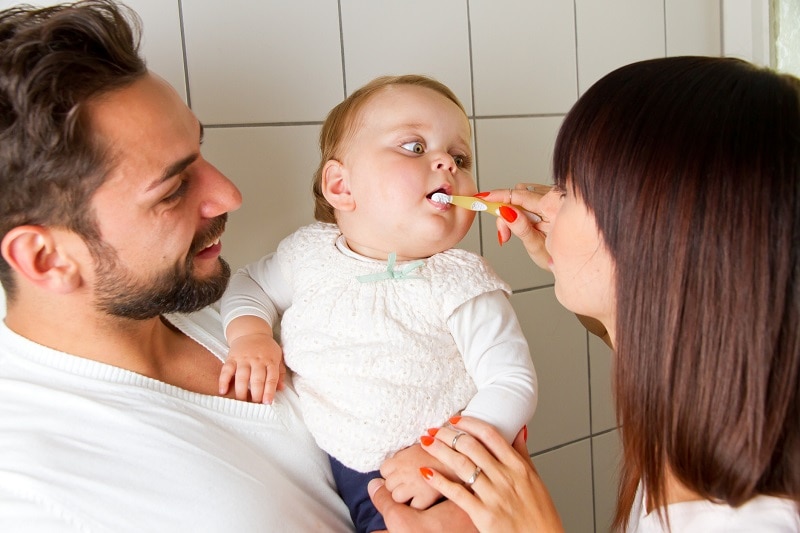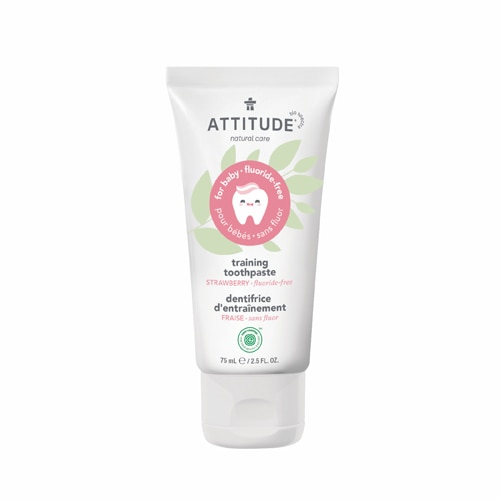[vc_row][vc_column][vc_column_text]If you have a new baby in your life, congratulations! It is both a thrilling prospect and a daunting responsibility. There are many considerations when it comes to daily wellness care for babies, one of which is oral hygiene.
The reality is that it is never too early to start addressing your baby’s dental health, especially gum care, because before a baby’s teeth begin to show?even before birth, in fact?they have already formed underneath the gums. An early start to oral care will help keep the underlying teeth healthy and encourage them to come in properly.
Learn when to start brushing baby teeth, all the facts about fluoride, which oral care products to try and how to practice dental hygiene for every stage of infancy all the way up to the toddler stage.

Fluoride Facts to Know When Caring for Baby & Toddler
You will need to decide about fluoride, which the greater professional dental community deems advisable for early dental care, even for babies.
Fluoride is purported to help:
- Rebuild (remineralize) weakened tooth enamel.
- Slow down the loss of minerals from tooth enamel.
- Reverse early signs of tooth decay.
- Prevent the growth of harmful oral bacteria.
And yet the fluoride question is not without controversy. Despite the fact that fluoride is promoted by the
American Dental Association, there are medical studies to suggest extreme caution in giving it to little ones. One, for example, in the
Environmental Health Journal, reviewed fourteen recent cross-sectional studies linking fluoride to cognitive deficits in children with elevated exposures. The scientists also cited three prospective studies from Mexico and Canada showing that early-life exposures were negatively associated with children's performance on cognitive tests.
Another
research team exploring fluoride safety for children advised that all dental personnel become familiar with its potential toxicity and the associated margins of safety: 5 to 10 grams of sodium fluoride is considered a Certainly Lethal Dose (CLD) for a 150-pound adult. The study suggests that frequent ingestion of fluoride during the period of tooth formation can lead to dental fluorosis, a chronic condition caused by excessive intake of fluorine compounds, marked by mottling of the teeth and calcification of the ligaments. This is especially important for parents offering fluoride-containing toothpastes in communities with sufficient fluoride already present in drinking water.
Dr. Hardy Limeback, B.Sc., Ph.D. in Biochemistry, D.D.S., head of the Department of Preventive Dentistry for the University of Toronto, and president of the Canadian Association for Dental Research, is Canada’s leading fluoride authority and, until recently, the country’s main proponent of the controversial additive.
Dr. Limeback states that even at low daily intakes of fluoride, such as those provided by fluoridation, susceptible and vulnerable groups of the population can experience ill health effects. His research team found that:
- Fluoride from water fluoridation can accumulate in bone to undesirably elevated levels.
- Fluoride intake at low daily doses alters tooth dentin.
- Fluoridation may cause dental fluorosis in children, especially those who are fed infant formula made with fluoridated water.
- Dental fluorosis is irreversible damage to the teeth.
- Dental fluorosis has increased to at least 1 in every 10th child in the US in fluoridated areas.
When to Start Brushing Baby Teeth
So, back to our initial question, when should you start oral care for babies, and what is the best way to proceed over time? These guidelines can help:
Birth to 6 months of age:
- Good oral care starts as soon as you get your new baby home. Always clean little gums gently after feeding, and avoid putting your baby to bed with a bottle, which may lead to serious problems such as choking, tooth decay, ear infections, future wheezing and asthma, and what could turn into an extended “feed-to-sleep” association.
- To clean and lightly massage gums, use a moistened washcloth, or these Bamboo Baby Tooth 'n' Gum Wipes, which are especially helpful to keep in your car, purse, beach pack, or diaper bag when you plan to be on-the-go.
- Infants normally begin teething between four and six months of age. When this process starts, baby’s gums can become red, swollen, and sensitive. To ease these symptoms, give your infant a cold wet washcloth to bite on, or a teething ring, such as this extra-soft, latex/PVC/BPA-free option with 360° bumps to stimulate gums.
- You may want to keep the teething ring in the freezer, as cold temperatures are soothing on distressed gum tissue.
6-12 months of age:
- If you like homeopathic remedies, you might try this Boiron Camilia Teething Relief to help manage painful gums and irritability, naturally free of preservatives and benzocaine?a topical/local anesthetic.
- Schedule your child's first dental appointment. Your little one should have a dental exam before his/her first birthday, or within 6 months after the first tooth comes in.
12 to 18 months of age:
- Assuming your child has now been examined by a pediatric dentist, continue to brush his or her teeth twice a day with water, but no toothpaste yet.
- Monitor your baby’s teeth to ensure they have an even tone. If you begin to notice a mottled appearance, which could indicate early cavities, schedule an appointment with your dentist.
- Make teeth brushing a positive ritual. You might include a song, phrase, and/or toy that keeps you both company. Do what you can to create happy associations with healthy, consistent dental care.
18 to 24 months of age:
· As your child approaches the two-year mark, all milk teeth should be in. This is when dental professionals typically advise the use of toothpaste. You may wish to weigh the pros and cons of fluoride before choosing among brands.
· Be advised that many commercial toothpaste products contain unhealthy additives like propylene glycol, sodium lauryl sulfate (SLS), sodium laureth sulfate (SLES), and artificial colors and sweeteners, such as aspartame, which metabolizes in the body to form methanol, a poisonous wood alcohol. The methanol is then quickly absorbed and converted by the body into formaldehyde, a very toxic compound.
· Safe, effective, natural toothpaste options include
Redmond Earthpaste Lemon Twist Amazingly Natural Toothpaste,
Attitude Baby Leaves Fluoride Free Gel Training Toothpaste Strawberry, and
Spry Kids Tooth Gel with Xylitol Original
As you can see, early oral hygiene training can have long-term effects, so it makes sense to help ensure a positive experience for your child, from the products you select, to the careful management of evolving oral care needs over time. Cheers to your baby’s healthy smile?for life![/vc_column_text][/vc_column][/vc_row][vc_row][vc_column][vc_text_separator title="Featured Products" border_width="2"][vc_row_inner equal_height="yes" content_placement="middle" gap="35"][vc_column_inner width="1/3"][vc_single_image image="170108" img_size="full" alignment="center" onclick="custom_link" img_link_target="_blank" css=".vc_custom_1699046466559{padding-right: 7% !important;padding-left: 7% !important;}" link="https://www.vitacost.com/oogiebear-360-teether-for-babies-seafoam"][/vc_column_inner][vc_column_inner width="1/3"][vc_single_image image="170107" img_size="full" alignment="center" onclick="custom_link" img_link_target="_blank" css=".vc_custom_1699046482847{padding-right: 7% !important;padding-left: 7% !important;}" link="https://www.vitacost.com/attitude-baby-leaves-fluoride-free-gel-training-toothpaste"][/vc_column_inner][vc_column_inner width="1/3"][vc_single_image image="170106" img_size="full" alignment="center" onclick="custom_link" img_link_target="_blank" css=".vc_custom_1699046503551{padding-right: 7% !important;padding-left: 7% !important;}" link="https://www.vitacost.com/aleva-naturals-bamboo-baby-tooth-n-gum-wipes"][/vc_column_inner][/vc_row_inner][/vc_column][/vc_row]




